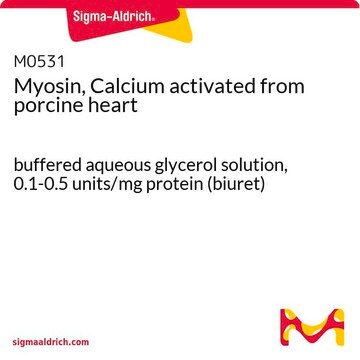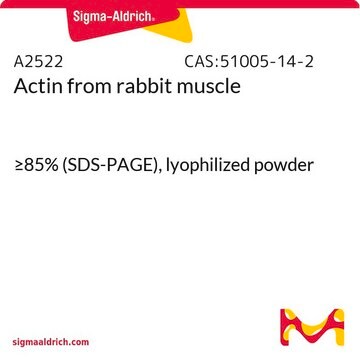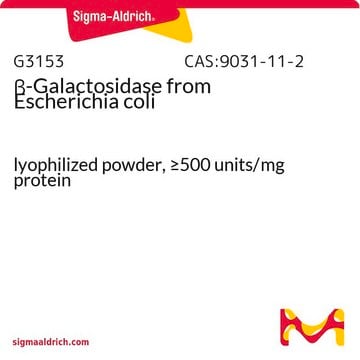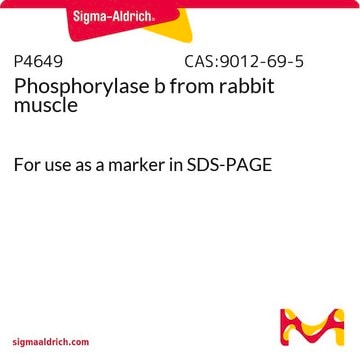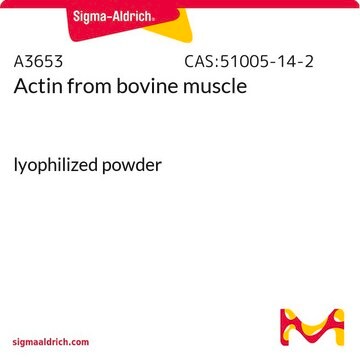M1636
Myosin, Calcium activated from rabbit muscle
buffered aqueous glycerol solution, 0.5-1.5 units/mg protein (biuret)
Synonym(s):
Myosin adenosinetriphosphatase
Sign Into View Organizational & Contract Pricing
All Photos(1)
About This Item
Recommended Products
biological source
rabbit muscle
form
buffered aqueous glycerol solution
specific activity
0.5-1.5 units/mg protein (biuret)
mol wt
heavy chain ~200 kDa (each)
light chain 15-20 kDa (each)
~480 kDa
technique(s)
ELISA: suitable
shipped in
wet ice
storage temp.
−20°C
Biochem/physiol Actions
Myosin interacts with actin in muscle and non-muscle cells. Myosin molecules consist of two major regions: tails (rods) and heads. They aggregate into filaments through the tail region and interact with actin and with ATP through the head region. Myosin molecules spontaneously assemble into filaments in solutions of physiologic ionic strength and pH. Thick filament consists mainly of myosin molecules. Myosin is activated by the enzyme ATPase. This activation is the immediate source of the free energy that drives muscle contraction. It binds to the polymerized form of actin, the major constituent of the thin filament. Multiple forms of myosin heavy chains exist for each muscle type-skeletal, cardiac, smooth and non-muscle isomyosin forms exist in different types of skeletal muscle, depending on the physiological function of the muscle. These are designated as type I (slow-twitch) and type II (fast-twitch). Myosin is one of three classes of cytoskeletal motor proteins that have been identified. The others are kinesins and dyneins. These three types of proteins are thought to be responsible for the many movements that occur in cells. Myosin has been shown to be involved in neurosensory function, vesicle trafficking, determinant partitioning, and cortical function.
Myosin interacts with actin in muscle and non-muscle cells. Myosin is one of three classes of cytoskeletal motor proteins that have been identified. The others are kinesins and dyneins. These three types of proteins are thought to be responsible for the many movements that occur in cells. Myosin has been shown to be involved in neurosensory function, vesicle trafficking, determinant partitioning, and cortical function.
Unit Definition
One unit will liberate 1.0 μmole of inorganic phosphorus from ATP per min at pH 9.0 at 25 °C in the presence of calcium.
Physical form
Solution in 50% glycerol containing 0.6 M potassium chloride and 10 mM potassium phosphate buffer, pH 6.8. Note: Solution may be hazy.
Storage Class Code
10 - Combustible liquids
WGK
WGK 3
Flash Point(F)
Not applicable
Flash Point(C)
Not applicable
Personal Protective Equipment
dust mask type N95 (US), Eyeshields, Gloves
Certificates of Analysis (COA)
Search for Certificates of Analysis (COA) by entering the products Lot/Batch Number. Lot and Batch Numbers can be found on a product’s label following the words ‘Lot’ or ‘Batch’.
Already Own This Product?
Find documentation for the products that you have recently purchased in the Document Library.
Customers Also Viewed
Lichuang Cao et al.
Food chemistry, 356, 129655-129655 (2021-04-09)
Phosphorylation of myosin regulatory light chain (MRLC) can regulate muscle contraction and thus affect actomyosin dissociation and meat quality. The objective of this study was to explore the mechanism by how MRLC phosphorylation regulates actomyosin dissociation and thus develop strategies
Brandon M Hoover et al.
Journal of pharmaceutical sciences, 109(1), 452-463 (2019-10-12)
Nanoparticle tracking analysis (NTA) is an important technique for measuring hydrodynamic size of globular biological particles including liposomes and viruses. Less attention has been paid to NTA of rod-like particles, despite their considerable interest. For example, amyloid fibrils and protofibrils
Beata Brozek-Pluska et al.
International journal of molecular sciences, 20(14) (2019-07-13)
Noninvasive Raman imaging of non-fixed and unstained human colon tissues based on vibrational properties of noncancerous and cancerous samples can effectively enable the differentiation between noncancerous and tumor tissues. This work aimed to evaluate the biochemical characteristics of colon cancer
E Bischoff et al.
Molecular microbiology, 35(5), 1005-1016 (2000-03-11)
Four large multigene families have been described in Plasmodium falciparum malaria parasites (var, rif, stevor and Pf60). var and rif genes code for erythrocyte surface proteins and undergo clonal antigenic variation. We report here the characterization of the first Pf60
Our team of scientists has experience in all areas of research including Life Science, Material Science, Chemical Synthesis, Chromatography, Analytical and many others.
Contact Technical Service